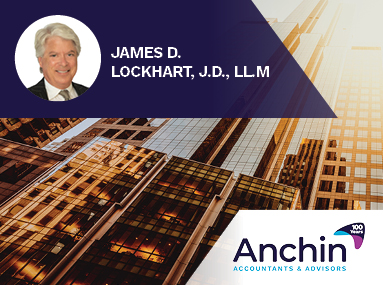Presented By: Anchin’s Real Estate Group
Is Delaware Statutory Trust Right For You?
By Anchin’s Real Estate Group June 20, 2023 8:00 am
reprints
Written by: James Lockhart, Partner, Anchin’s Real Estate Group
Sophisticated sponsors, investors and other real estate professionals understand that there are considerable advantages to investing in real estate for building wealth, including regular cash flow, significant tax deductions, diversification, and tax-free exchanges of real estate. While there are different real estate ownership structures, such as a partnership, limited liability company (LLC), or tenant-in-common (TIC), it is the Delaware Statutory Trust (DST) that may prove, depending upon circumstances, to be the most flexible and beneficial way in which to own real estate from an acquisition and disposition investment strategy.

How DSTs Work
The IRS approved the use of DSTs in 2004 by confirming that ownership of a beneficial interest in a properly structured DST is the equivalent of owning an undivided interest in the real estate owned by the DST.
While DSTs can become quite nuanced, the essential concept is straightforward: the trust, created under Delaware state law, allows multiple investors to purchase and hold a real estate asset. The trust is organized and managed by a trustee, which is usually the sponsor. Investors are known as beneficiaries that acquire an undivided interest in the asset held by the DST. Like a TIC, an investor can use a beneficial interest in a DST as replacement property in a 1031 exchange. Managing trustee of the DST is usually the sponsor or affiliate of the sponsor, and the DST owns title to 100 percent of the interest in the property. Typically, investors are not required to sign guarantees nor non recourse carve-outs on the loan.
A DST appears to be similar to a TIC structure, but operates more like an LLC. Like members of an LLC, the beneficial owners of a DST enjoy protection from personal liability for the actions of the DST. Similar to an investor of a TIC and LLC, the DST beneficiaries are entitled to their proportionate share of income, deductions and losses, and related cash flow from the investment. DSTs are governed by a trust agreement that places management of the DST in the hands of the trustee or an independent manager, with the beneficial owners having little to no say in the management of the DST.
A DST is generally preferable to a TIC, since there are perceived weaknesses and difficulties in financing a TIC. For instance, a TIC is limited to 35 investors and requires a single member LLC for each TIC investor, which requires lender financing for each of the TIC investor entities. With a DST, on the other hand, there is one loan, and the lender does not need to underwrite each beneficial owner. Furthermore, a TIC action requires a unanimous vote, whereas in a DST there is centralized management as the beneficial owners have no right to vote, which eliminates the concern that a single investor can hold up the process and other matters.
Restrictions on DSTs
DSTs and their trustees are subject to a set of IRS restrictions sometimes referred to as the “Seven Deadly Sins.” These are: (1) No new capital contributions allowed once the DST is closed, (2)No new or renegotiated financing, (3) No reinvestment (all proceeds from a sale must be distributed to beneficiaries), (4) Capital expenditures are limited to normal repair and maintenance, (5) Reserves or cash held between distribution dates can be invested only in short-term debt obligations, (6) All cash other than necessary reserves must be distributed on a current basis, and (7) No new leases or renegotiated leases are allowed after the DST is closed.
While investors should be aware of these restrictions, they should also be equally aware that many can be mitigated with experienced legal counsel and professional tax advice. For instance, a master lease structure can be used to renegotiate leases and avoid leases with multiple, actual tenants. Also, a springing LLC can be used when a major issue arises. This allows the DST to convert to an LLC to take actions to remedy a situation (e.g., loan refinance).
Additional advantages of DSTs
With respect to sponsors, DSTs offer an additional source of equity. DSTs provide 1031 investors the ability to trade into a DST. This flexibility opens a whole new pool of potential investors. One resource reports that $32.1 billion of 1031 equity has been raised from 2010 through 2022.
Another appealing aspect of DSTs is that upon sale, each beneficiary, including the sponsor, can do a 1031 exchange of their respective proceeds without the consent of the other beneficiaries. They can even trade into another DST of the same or different sponsor. This is also good news for sponsors, who have a pipeline of deals and, consequently, will have more dollars to invest in their next project if they take advantage of a DST structure. This flexibility, unlike an LLC or partnership, also avoids the need for a drop-and-swap structure which can be risky from a tax perspective.
Is a DST right for you?
DSTs are becoming more popular and have significant tax benefits for sponsors and investors. Because of their unique structure and requirements, DSTs should be approached with experienced legal counsel and tax professionals to ensure they are properly structured to take full advantage of their benefits.For more information or to further discuss Delaware Statutory Trusts, please contact James Lockhart, partner in Anchin’s Real Estate Group, at James.Lockhart@anchin.com, or your Anchin Relationship Partner.

![Spanish-language social distancing safety sticker on a concrete footpath stating 'Espere aquí' [Wait here]](https://commercialobserver.com/wp-content/uploads/sites/3/2026/02/footprints-RF-GettyImages-1291244648-WEB.jpg?quality=80&w=355&h=285&crop=1)

